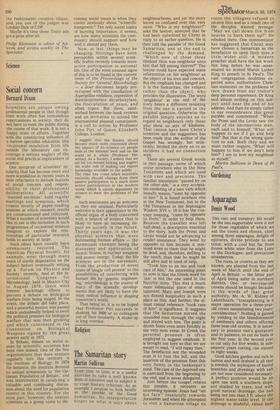Religion
The Samaritan story
Martin Sullivan
From time to time, it is a useful exercise to take a well known Biblical narrative and to subject it to close literary criticism. As an example I propose to look briefly at the parable of the Good Samaritan. Its interpretation hinges on what it says about neighbourliness, and yet the story leaves us confused over this very issue. "Who is my neighbour?" asks the lawyer, annoyed that he had been outwitted by Christ in reply to an earlier question. He is then told the parable of the Good Samaritan, and at the end is challenged by the demand, "Which now of these three thinkest thou was neighbour unto, him that fell among thieves?" The lawyer could have expected some information on his neighbour as the object of his love and concern. But the emphasis has changed and it is the Samaritan, the subject rather than the object, who provides the illustration. The word 'neighbour' at the end of the story bears a different meaning from the one it carried in the original question. Otherwise the parable simply enjoins us to regard as neighbours only those who show us acts of kindness. That cannot have been Christ's intention and the suggestion has been made that the author of the Gospel has wrongly, but artistically, latched the story on to an incident it had no connection with.
There are several Greek words in this passage, some of which occur nowhere else in the New Testament and which are used with care and precision. The familiar translation "passed by on the other side," is a very acceptable rendering of a rare verb which literally means, "went by opposite to him." It is found nowhere else in the New Testament, but in the Old Testament in the Septuagint Wisdom XVI v. 10 it has the contrary meaning, "came by opposite to them," in order to help them. Because the traveller was left half-dead, a description essential to the story, both the Priest and' Levite would not be advancing to render assistance. They went by opposite to him because it mattered more to them that he might be dead, and, therefore, defiling to the touch, than that he might be' still alive and in need of help.
"Took him to an inn and took care of him." An interesting point to note is that the Greek word for 'inn' is not the one used in the Nativity story. This was a much more substantial place of entertainment. Mary and Joseph were not denied hospitality in such a place as this. And further, the almost casual reference "took care of him" is significant. It suggests that the Samaritan nursed the wounded man through the night and stayed with him. The point is driven home even more forcibly in the very next verse. In Greek the personal pronoun is often employed to suggest emphasis. It is brought out here so that we are meant to read, "I will repay thee." The benefactor not the wounded man is to foot the bill, and the insertion of the pronoun fixes this very firmly in the innkeeper's mind. The care of the deprived one is exercised from the beginning to the end, and is never delegated. Just before the Gospel relates this parable, it recounts an interesting episode. Jesus had "set his face" resolutely towards Jerusalem and when He attempted to visit a Samaritan village en
Spectator March 30, 1974
route the villagers refused to receive Him and as a result two of the disciples wanted revenge: "May we call down fire from heaven to burn them up?" He rebuked them. One commentator has suggested that Christ may have chosen a Samaritan as the benefactor to open their eyes a little wider still. A modern preacher shall have the last word. Not long before he was assassinated we invited Martin Luther King to preach in St Paul's. The vast congregation doubtless expected some authoritative Christian statement on the problems of race, drawn from our visitor's deep personal experience. Dr King said almost nothing on this subject until near the end of his address. And then he simply called to our remembrance this great parable and commented: "When the Priest and the Levite saw the body of the unconscious man, each said to himself, 'What will happen to me if I go and help him?' But that is the wrong question to ask. Both they and we must rather inquire, 'What will happen to him if we don't help him?' I am to love my neighbour as myself."
Martin Sullivan is Dean of St Paul's.


































 Previous page
Previous page